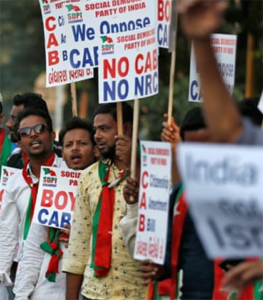Hindu ‘Rashtra’ could see refugee exodus from India
The Indian Government’s lurch towards Hindu nationalism is producing refugees from among the nation’s minorities who fear persecution, new data shows.
Recent legal cases in Australia, Canada and New Zealand have established new precedents that people among India’s minorities have “well-founded fears” of persecution, violence and discrimination.
 And while defenders of India’s new Citizenship (Amendment) Act (CAA) argue that it is in keeping with India’s humanitarian values, others say that the discriminatory nature of the CAA and the crackdown on dissent are signs that a growing number of Indians themselves face persecution.
And while defenders of India’s new Citizenship (Amendment) Act (CAA) argue that it is in keeping with India’s humanitarian values, others say that the discriminatory nature of the CAA and the crackdown on dissent are signs that a growing number of Indians themselves face persecution.
In international law, persecution – serious harm arising from the sustained or systemic violation of human rights and an inability to obtain protection from the state – is a key requirement to determine who is a refugee.
Recently, the number of Indians seeking asylum and being recognised as refugees has spiked.
UNHCR statistics though show that more and more Indians are seeking asylum and are being recognised as refugees.
There are currently 9,602 refugees and 51,812 pending cases of asylum seekers from India, according to the latest UNHCR data.
This represents a 46 per cent increase in the number of Indian asylum seekers and a 24 per cent increase in recognised Indian refugees since 2016.
National statistics from countries of asylum including the United States, Canada, Australia, and New Zealand also show the number of Indian asylum seekers and/or refugees is on the increase.
Also, case law from several countries of asylum shows that Indians who have left the country fearing persecution linked to the rise of Hindu nationalism are already being recognised as refugees.
Australia’s Administrative Appeals Tribunal (AAT) recently recognised the claim of a Sikh woman who converted to Islam and married a Muslim man. She feared harm from her family and society at large. In reaching its decision, the tribunal relied on information which suggested that a hostile climate towards interfaith marriages was created in part by groups affiliated with the government:
“Since the election of the Modi government in May 2014, Hindu right-wing groups that claim proximity to the ruling BJP have stepped up social pressure and violence against inter-faith marriages involving Hindus,” the AAT found.
The AAT also recognised the case of a gay man who feared harm from his family with connections to the BJP and the right-wing paramilitary organisation RSS.
The tribunal concluded that “the views of the BJP and conservative elements of the Hindu community towards marriage and homosexuality generally, and prevailing social pressures in India on marriage and procreation, the Tribunal accept that the applicant holds a genuine subjective fear of serious harm in India from his family, community and the authorities on the basis of his sexuality.”
Canada’s Immigration and Refugee Board granted refugee status to a Muslim man from Maharashtra working in the beef industry who feared harm from cow vigilante groups.
In reaching its decision, the board reasoned that “vigilantes may be acting in the name of cow protection, but that be separated from the reality that their actions are inextricably linked to religious intolerance that disproportionately affects Muslims”.
Interestingly, the board recognised the BJP-led government’s role in aggravating the risks facing the claimant.
Speaking at the Global Refugee Forum in Geneva late last year, Pakistani Prime Minister Imran Khan warned that India could be the source of the “biggest impending refugee crisis.”
President Khan said the adoption of the CAA had left 1.9 million potentially stateless people out of the National Register for Citizens (NRC) in Assam.
And he said the revocation of Article 370 and lockdown of Kashmir could trigger a proportion of India’s Muslim population to leave the country.
Indian scholar and international refugee law specialist Professor Suraj Girijashanker says that it is difficult to know the extent to which Indians have fled the country due to risks associated with the rise of Hindu nationalism.
“But with reports of police brutality and mass arrests targeting activists and Muslims, the construction of detention centres for those who fail to make the NRC, and the stifling of freedom of speech in Kashmir, the number of Indians being recognised as refugees on the basis of risks associated with rising Hindu nationalism will only grow,” Prof Girijashanker said.
“If humanitarian values and protection of the persecuted were priorities as advocates of the CAA suggest, this would not be the case,” he said.












